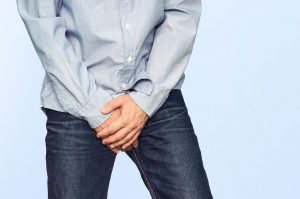
Your body needs to filter more blood when it gets cold, meaning it’s rushing to your vital organs to help keep them warm and functional. This process means you must pee more, leading to what’s been dubbed “cold-induced diuresis.”
You might think holding your pee will help keep you warm, but the truth is that you should relieve yourself when the urge hits.
Further, if you’re outside for an extended period and find yourself needing the bathroom frequently, get inside: it could be a sign of hypothermia – definitely something to keep an eye on.
Regardless of the temperature, holding your pee is never an ideal situation. Not only is it uncomfortable, but it can lead to some issues, as well.
For one thing, it may lead to pain. Regularly ignoring the urge to pee can result in bladder or kidney pain and even pain while urinating. Pelvic cramps are also a risk.
Holding pee may also increase the risk for a urinary tract infection or UTI. Holding urine may provide time for bacteria to multiply and cause infection. People who don’t drink much fluid have a higher risk for UTI than those that stay well hydrated.
Regularly holding urine, over time, may also lead to bladder stretching, which has the potential to lead to limits on normal urination. Bladder muscles may no longer be able to contract to release pee normally, potentially requiring extra measures like a catheter.
Holding urine can also lead to weaker pelvic floor and urethra muscles and a greater risk for kidney stones.
Getting rid of urine, of course, isn’t always easy. If you’re out shopping or go for a winter walk, you might not have immediate access to answer when nature calls. Here are a few tips to help you hold it in an emergency:
- Cross legs while standing
- Pass gas
- Pee immediately upon waking
- Plan scheduled bathroom breaks separated by roughly 2-3 hours
- Don’t wait for emergencies